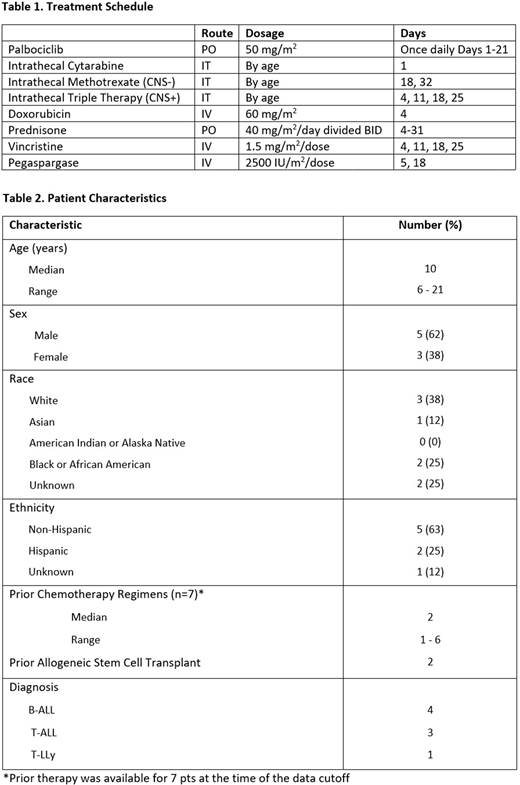Background: Despite improvements in outcomes for children with B- and T-cell acute lymphoblastic leukemia and lymphoblastic lymphoma (B-ALL, T-ALL, B-LLy and T-LLy), the outcome of patients with primary resistant or relapsed disease remains very poor, particularly for children with second or greater relapses and with T-cell disease. Deregulation of cell cycle machinery is essential for both the induction and progression of ALL (Sicinska et al. Cancer Cell 4:451-61, 2003). Additionally, targeting cell cycle regulators CDK4 and 6 efficiently suppresses ALL growth and disease progression in vivo (Sawei et al. Cancer Cell 22:452-65, 2012) and this effect is augmented by conventional chemotherapy. These data provided the rationale for investigating the CDK4/6 inhibitor palbociclib in relapsed/refractory ALL and LLy. Preliminary results from the ongoing Children's Oncology Group (COG) AINV18P1 trial are reported.
Methods: Patients aged 1-30 years with first or greater isolated or combined marrow relapses of T-ALL or T-LLy and second or greater relapses of B-ALL or B-LLy are eligible for COG AINV18P1 (NCT03792256). Patients with refractory disease with at least 2 prior induction attempts or first relapse refractory to at least one prior re-induction attempt are also eligible. This is a 2-part study conducted at selected COG sites. In Part 1 of the study (dose determination), palbociclib was administered orally once daily for 21 consecutive days, first as a single agent (days 1-3) and subsequently in combination with 4-drug re-induction chemotherapy (Table 1). Study treatment consisted of a single cycle of therapy. A starting palbociclib dose of 50 mg/m2/dose was explored with one dose de-escalation (35 mg/m2/dose) using the rolling six design to determine the maximum tolerated dose (MTD) or recommended phase 2 dose (RP2D). Part 2 (expansion cohort) is accruing 6 additional patients (pts) at the MTD for further assessment of the safety and feasibility of combination therapy. Dose-limiting toxicities (DLTs), defined as hematologic and non-hematologic toxicities exceeding baseline toxicities observed with re-induction chemotherapy alone, are assessed throughout the treatment cycle. The primary aims of the study are safety, determination of the MTD/RP2D and assessment of palbociclib pharmacokinetics (PK). Secondary aims are assessment of the biological and preliminary clinical activity of combination therapy in this patient population.
Results: As of June 30, 2020, 8 pts have enrolled; 6 in Part 1 and 2 in Part 2. All 6 pts in Part 1 completed one full cycle (32 days) of protocol therapy. The median (range) age of pts is 10 (6-21) years and 62% are male (Table 2). Three pts had T-ALL, 4 B-ALL and 1 T-LLy. Pts received a median (range) of 2 (1-6) prior chemotherapy regimens and 2 pts underwent prior allogeneic stem cell transplant. All 6 pts in Part 1 experienced grade 3-4 toxicities, most commonly hematologic: anemia (3 pts), neutropenia (5 pts) and thrombocytopenia (4 pts). Three pts had grade 3 infections and one pt had grade 3 hyperbilirubinemia, which resolved. No hematologic or non-hematologic DLTs were observed at the 50 mg/m2/dose of palbociclib in Part 1 and accrual to the expansion phase of the trial at this dose continues. PK and pharmacodynamic studies assessing cell cycle inhibition are also ongoing.
Conclusions: Palbociclib in combination with 4-drug re-induction chemotherapy is safe and well tolerated in children and young adults with relapsed/refractory ALL and LLy. Further assessment of the feasibility and activity of combination therapy is ongoing in the expansion phase of this trial.
Raetz:Celgene: Other: DSMB member; Pfizer: Other: Institutional research funding. Teachey:La Roche: Consultancy; Janssen: Consultancy; Amgen: Consultancy; Sobi: Consultancy. Norris:Merck: Other: Travel funding. Gore:Amgen, Novartis, Roche: Membership on an entity's Board of Directors or advisory committees. Loh:Medisix Therapeutics: Membership on an entity's Board of Directors or advisory committees; Pfizer: Other: Institutional Research Funding.
This study includes off-label use of palbociclib in children and young adults with relapsed/refractory acute lymphoblastic leukemia and lymphoblastic lymphoma.
Author notes
Asterisk with author names denotes non-ASH members.


This feature is available to Subscribers Only
Sign In or Create an Account Close Modal